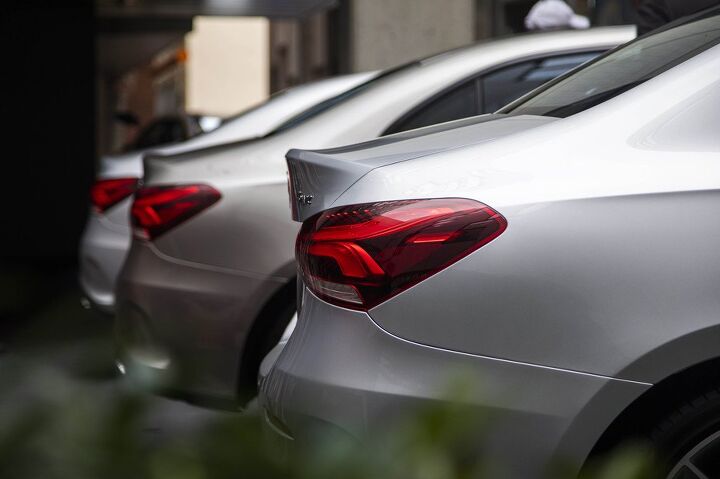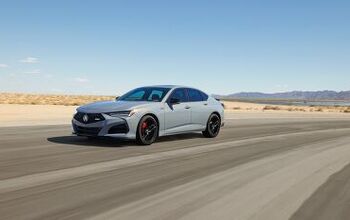How Would Dealers Rate Their Brand? Scorecard Ranks Winners and Losers

Cox Automotive, in conjunction with Automotive News, just released its Retail Brand Scorecards Study for 2018. The survey is interesting in that it ranks the perceived value of automakers by assessing how desirable they are to dealerships via an A-through-F grading system. Though, as engaging as it might be to look at these traits from a highly specific viewpoint (how dealerships see you in relation to specific manufacturers), we’re not sure how useful the average consumer will find them. Dealers and industry geeks, however, may want to take notice.
“This study represents a comprehensive review of brands from a unique perspective — how well they support the success of dealers,” said Cox Automotive Chief Economist Jonathan Smoke. “As we assembled the data and began to see how the brands performed differently, we started looking at the results as grades in high school, where the most well-rounded and high-achieving students are those who perform well across a wide range of disciplines. With that scorecard framework, we found a clear set of brands that are honor-roll worthy, as they are in essence the hardest-working, most successful students.”
By separating desirable aspects into “subjects” tied to a graded system, you get a better sense of where specific manufacturers are weak. Core subjects include a brand ability to capture the “best customers” (people who frequently purchase new vehicles and get most of their servicing done at the dealership) to the newness and diversity of a brand’s lineup.
There are even metrics for the general attitude associated with a given brand, how much digital/physical traffic their products receive, and customer loyalty, with bonus points awarded to automakers for delivering consistent shares across market areas or allowing dealers to work more freely with OEMs.
Overall, this put premium nameplates on a more consistent average. Their ability to repeatedly acquire the “best customers,” while also offering fresher lineups and a superior public image served them well. Unfortunately, this meant that one major demerit in any category had the ability to throw them to the bottom of the pile.
For example, Jaguar scored well in most categories. But its lackluster vehicle range and middling consumer loyalty resulted in the lowest overall score of any luxury automaker. Tesla, Genesis, Porsche, and Land Rover were also severely impacted by their limited model offerings — despite the latter pair being almost unstoppable everywhere else. Were it not for their more focused fleets, all four would have placed much higher overall.
The takeaway here should be just how close a race it is between most premium brands. “One additional vehicle in the Lexus lineup would have put [them] on top of Mercedes,” explained Smoke.
LUXURY BRANDS (2018)
MakeBest CustomersRangeAgeTrafficLoyaltyAttitudinalMercedes-BenzAA-AAAALexusAB+AAAABMWAAAAAAAcuraACAAAAAudiAB+AAAACadillacAB-AABA-VolvoACAAB+APorscheAFAA+AALand RoverAFA-AAB+LincolnA-C+AC+BB+InfinitiA-C+AAC+AGenesisAFA+C-A+ATeslaA+FC+AAA+JaguarAFABCB+Things were more diverse in the mainstream breakdown, with both higher and lower scores overall. Ford narrowly beat Toyota for top honors, thanks to bonus points stemming from superior “geographic consistency.” Chevrolet garnered extra credit for also having a consistent market share balance across the United States.
While that doesn’t sound like much, this is wildly important when someone considers purchasing a dealership — it likely results in more sales for the brand down the line. However, Chevrolet also ranked as one of the industry’s worst performers when it comes to franchised dealers citing automaker mandates and restrictions that hold back business, according to Cox.
NON-LUXURY (2018)
MakeBest CustomersRangeAgeTrafficLoyaltyAttitudinalFordAA-A-AAAToyotaAAAAAAHondaACAAAAChevroletA-AAAAASubaruAFAAAARAMB+FC+AAAHyundaiACACAAJeepAFB+A+AAGMCAFB+AA-ANissanBAB+CAAKiaB-D+A+FAADodgeC+FAAFA-VolkswagenAFA-FAAChryslerAFAAD+AMazdaAD+AC-AABuickAFAFCAMiniA+FAFCC+FiatAFB+FB+FSmartAFBFC+FMitsubishiDFA-FFB-The brands that performed the best were the ones that lacked any major blemishes on their score card. Being overly specialized was seen as overwhelming negative. When stacked with weaknesses in other subjects, an automaker was swiftly assessed as a bottom-rung contender. In fact, most companies that received an C ranking in product diversity (range) could count on being in the bottom half of the pack.
There’s more to unpack here and, considering Automotive News’ involvement in the project, their assessment might be a good place to start. It goes into slightly greater depth and offers an adjusted grade point average for each brand.
For those of you not interested, and perhaps still confused by the study’s metrics for each category, here they are, as stated by Cox Automotive:
Best Customers: Analyzing segmentation data from Claritas, the team identified a brand’s ability to capture ideal customers — those who, among other traits, are most likely to buy new; buy frequently; obtain financing from the dealership; and return to the dealer for parts and service.
Range of Offerings: Assessing the strength of a brand’s products across the segments driving volume and growth in the market. The more complete the offerings, the more likely a brand will attract the best customers.
Age of Offerings: Grading the “newness” of a brand’s vehicle line-up by looking at specific models and their life cycle. As is well documented in the industry, a fresh product line drives interest and traffic and more profitable sales.
Digital Traffic: Measuring website traffic from Autotrader.com and KBB.com, two of the largest consumer shopping sites – both of which are Cox Automotive properties. This data set grades consumer interest by measuring average new car shopping activity by model.
Shopper Loyalty: Assessing shopper loyalty on KBB.com developed by observing consumers who price a trade-in from one brand and then price a new vehicle from the same brand. Higher shopper loyalty increases the likelihood of satisfied customers and repeat purchases.
Attitudinal: Using data from Kelley Blue Book’s Brand Watch study, all brands are rated in the key attributes that most drive purchase behavior, including reputation, durability, affordability, and safety.
[Images: Mercedes-Benz; Ford]

A staunch consumer advocate tracking industry trends and regulation. Before joining TTAC, Matt spent a decade working for marketing and research firms based in NYC. Clients included several of the world’s largest automakers, global tire brands, and aftermarket part suppliers. Dissatisfied with the corporate world and resentful of having to wear suits everyday, he pivoted to writing about cars. Since then, that man has become an ardent supporter of the right-to-repair movement, been interviewed on the auto industry by national radio broadcasts, driven more rental cars than anyone ever should, participated in amateur rallying events, and received the requisite minimum training as sanctioned by the SCCA. Handy with a wrench, Matt grew up surrounded by Detroit auto workers and managed to get a pizza delivery job before he was legally eligible. He later found himself driving box trucks through Manhattan, guaranteeing future sympathy for actual truckers. He continues to conduct research pertaining to the automotive sector as an independent contractor and has since moved back to his native Michigan, closer to where the cars are born. A contrarian, Matt claims to prefer understeer — stating that front and all-wheel drive vehicles cater best to his driving style.
More by Matt Posky
Latest Car Reviews
Read moreLatest Product Reviews
Read moreRecent Comments
- Brian Uchida Laguna Seca, corkscrew, (drying track off in rental car prior to Superbike test session), at speed - turn 9 big Willow Springs racing a motorcycle,- at greater speed (but riding shotgun) - The Carrousel at Sears Point in a 1981 PA9 Osella 2 litre FIA racer with Eddie Lawson at the wheel! (apologies for not being brief!)
- Mister It wasn't helped any by the horrible fuel economy for what it was... something like 22mpg city, iirc.
- Lorenzo I shop for all-season tires that have good wet and dry pavement grip and use them year-round. Nothing works on black ice, and I stopped driving in snow long ago - I'll wait until the streets and highways are plowed, when all-seasons are good enough. After all, I don't live in Canada or deep in the snow zone.
- FormerFF I’m in Atlanta. The summers go on in April and come off in October. I have a Cayman that stays on summer tires year round and gets driven on winter days when the temperature gets above 45 F and it’s dry, which is usually at least once a week.
- Kwik_Shift_Pro4X I've never driven anything that would justify having summer tires.




































Comments
Join the conversation
Shopper loyalty seems like an odd metric, as it only measured those who use a particular website. What about someone who buys a new car every 2 years and trades in the old one and never prices out the trade on KBB? Apparently they are not a "loyal customer".
There are nearly same number of luxury as non-luxury brands. We must be rich